Our corporate policy is not aimed at short-term success, but rather at forward-looking development. We make our decisions with a view to the interests of future generations. This means that we align business activities with the principles of economic, ecological and social values. We are firmly convinced that a long-term and value-oriented approach is the key to economic success. This is why we have also anchored such an approach in our corporate strategy.
In Vision 2020, Hochland SE has described its goals for all sites up to the year 2020. The subsequent Vision 2025 is being finalised at the time of reporting. The Hochland Group’s strategy is derived directly from the key variables market position, innovation performance, productivity, attractiveness as an employer, liquidity and profitability. These characterise its entrepreneurial ambitions and form the focal points on the basis of which success is measured.
The Hochland Wheel
Hochland Germany’s central instrument for corporate management is the Hochland Wheel with a rolling three-year horizon. This tool shows the strategic goals of Hochland Deutschland, derived from the group’s vision, in a circular graphic arrangement – hence the name. The company uses New Performance Management as a tool to address the key issues set by the wheel. This process takes place both at the level of the management team and at the level of each area of Hochland. The performance of the annual and four-month targets set within this framework is evaluated once in the tertial period.
Management
Hochland uses management systems to implement overriding corporate objectives with the help of self-control based on continuous optimisation. All management systems that ensure continuous improvement are established as certified standards, according to IFS, ISO 50001 and other standards or norms.
The Hochland Wheel valid at the time of publication of this report is divided into three main sections, each with several themes:
Foster Growth
Cooperation and Partnerships
Partnership models with regard to all areas of the supply chain are part of the Hochland growth strategy. Hochland strives to expand its portfolios, ranges, services and fields of action with regard to sustainability, for example through licence marketing and regionality.
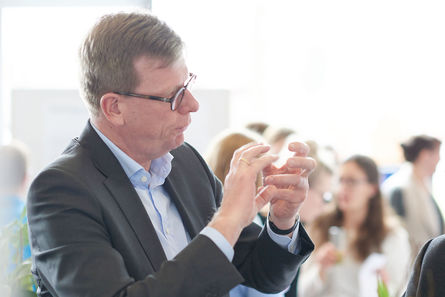
Preferred Supplier Status
Hochland aims to expand its position as a preferred supplier to selected customers through intensive networking up to the top levels of the retail trade as a competent discussion partner in all aspects of sustainability.
Diversification of Business Units
External customer orientation is to be further promoted by Hochland gearing its processes more closely to the needs of individual customers.
Development of New Business Models
In order to generate sustainable growth, Hochland plans to advance existing business models and generate additional ones. Possible examples are digital business models, profit centre models and platforms for utilising milk to the full.
Lighthouse Projects for Recycling Management
Hochland is convinced that future economic success can only be achieved if resources are used in a socially and ecologically responsible manner and are not consumed. Hochland sees the principle of the circular economy as providing the necessary decision-making aids.
Ensuring Stability
Future Prosperity of the Dieue Site
The Hochland Group plans to establish Dieue as a location for sustainable milk production and as an innovation platform for three categories of cheese. – Note: The Dieue site in France belongs to the Hochland Group – but not to Hochland Deutschland GmbH. This section only serves to explain the Hochland Wheel in this regard.
Awareness of Productivity and Profitability
Hochland strives for a holistic approach to productivity and competitiveness from the perspective of its customers. This can be achieved, for example, by means of value analyses, hedging strategies or robustness in the event of price fluctuations on the commodity market. The existing focus on productivity and efficiency of processes in production and administration will be expanded in this way.
Business Process Orientation
Hochland strives to further improve its own business processes and actively align them with the needs of external and internal customers. Digital tools are used to continuously improve transparency and efficiency with regard to internal and external customer orientation.
The compliance management system already in place for adherence to legal regulations and ethical standards will be further systematised and thus strengthened.
Supporting Transformation
Digital Literacy and Attitudes
Hochland aims to promote a positive attitude towards digitisation within the company and further develop the digital competence of the organisation. New digital tools are seen as an opportunity and a way of making work easier.
Encouraging Personal and Individual Responsibility
Employees’ personal responsibility and scope for action are to be further expanded. Hochland seeks to promote decision-making at all levels of the hierarchy. Managers are to provide guidance, develop teams and provide an orientation framework. Hochland employees are to take responsibility for their actions – also with regard to their own resources. More space for dialogue and strategic discourse is to be created.
Employer Branding
For Hochland, its own employees are the decisive factor in recruiting and retaining staff. Hochland is aware that each and every person makes a significant contribution to the attractiveness of Hochland as an employer.
Leader in Milk
Hochland wants to continue to live up to its claim to be the Leader in Milk. The company is raising awareness of the milk issue among retailers, non-governmental organisations and consumers. Hochland will continue to actively offer retailers its expertise in the development of new concepts based on sustainable milk, especially in the areas of animal welfare and circular economy. As in the past, education and training is to drive the transformation of Hochland to become a learning organisation with extensive self-management.
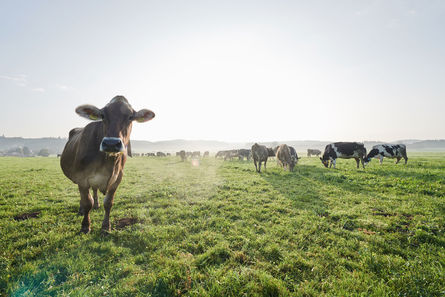
More and more consumers are consciously choosing products and brands made by manufacturers who credibly fulfil their responsibility towards nature and society. The focus is increasingly on the origin of raw materials and the social and ecological conditions in which products are manufactured. We assume responsibility for people and the environment – also with regard to future generations. At Hochland we want to function as a model for sustainability and recycling management.
Hochland has developed its sustainability strategy by means of a systematic process. The aim was to anchor sustainable corporate management along the entire value chain. To this end, Hochland has created the basis for a materiality matrix in 2016 and 2017 with a materiality analysis, a cultural analysis and a stakeholder dialogue. In this matrix, Hochland first named 23 relevant fields of action, then narrowed them down to 13 fields and finally prioritised 6 of the fields of action in an internal selection process. In 2019, Hochland reviewed the results again. The company interviewed 50 internal and external stakeholders in a further stakeholder survey. The materiality analysis derived from this has been reviewed by Hochland with regard to two aspects in particular: Firstly, with regard to a holistic view of the effects of entrepreneurial action – both within the company and externally (holistic impact). Secondly, with regard to the orientation towards ideas relating to the circular economy. As a result, Hochland has updated the fields of action in the materiality matrix and confirmed the six fields of action that had already been given high priority:
Milk and animal welfare
CO2 and climate
Employee health and safety
Portfolio management for sustainable products
Stakeholder dialogue
Business relations
Prioritised Fields of Action
Field of Action: Milk and Animal Welfare
Hochland takes a self-critical look at the global consequences of European milk production and milk trade. That is why Hochland considers the effects of milk production on humans, animals and the environment. In the future, the company will increase its influence on how its most important raw material is produced. To this end Hochland is building value alliances with farmers, processing suppliers and other stakeholders.
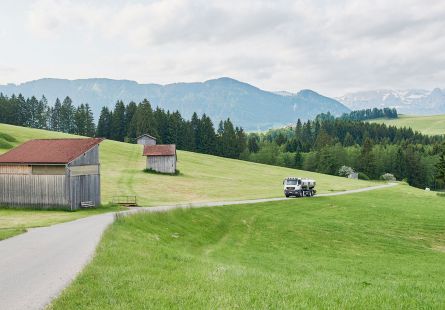
Field of Action: CO2 and Climate
Due to its value chain, Hochland has a considerable CO2 footprint. The aim of the Hochland climate strategy is to make the company CO2 neutral. All areas of CO2 emissions, their measurement and the reduction and compensation of CO2 are examined. In particular, the areas of raw materials, packaging, energy, mobility and logistics are scrutinised.
Field of Action: Employee Health and Safety at Work
Work must not only not make you sick. This is why both the maintenance and promotion of employee health are important assets for Hochland. Hochland promotes health and employee satisfaction by means of prevention and incentives for increased personal responsibility. The focus here is on ergonomic work, healthy employee catering and measures to promote health and exercise.
Field of Action: Portfolio Management for Sustainable Products
In view of changing eating habits and taking into account the environmental impact of its own products, Hochland would like to expand its portfolio with even more sustainable offers. This can be done above and beyond the raw material milk and the product of cheese. For future-oriented products Hochland will seek to reduce the consumption of resources and the generation of CO2 and methane in the production process.
Field of Action: Stakeholder Dialogue
As a company, Hochland conducts relationships with many stakeholders. With the introduction of a professional stakeholder participation process, Hochland is aiming to establish a systematic approach. Hochland sees this as an opportunity to develop as an organisation and to recognise, anticipate and meet the needs of society and the environment even more effectively.
Field of Action: Business Relations
Relations with business partners are essential for Hochland. Hochland intends to develop its business relationships with suppliers and customers in the future in the form of collaborative partnerships. These partnerships should be based on shared values, long-term and mutually beneficial. There should be more joint development of products and business processes with customers in order to generate innovations together. Sustainability requirements should be taken into account even more strongly with regard to purchasing strategies and purchasing conditions.
The Hochland Sustainability Programme
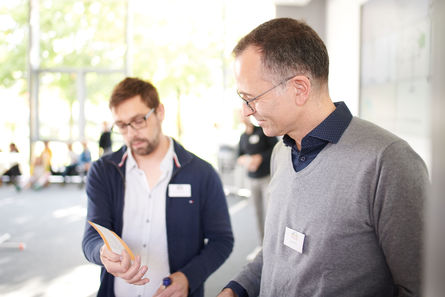
Hochland has advanced its sustainability goals in 2019 and adopted the Hochland Sustainability Programme on the basis of the updated sustainability strategy. The aim of the programme is to manage sustainability performance.
The sustainability programme offers orientation with regard to the overarching ambitions concerning four areas. Hochland continuously sets itself goals to achieve these ambitions.
THE HOCHLAND MATERIALITY MATRIX
Note: When you select the colored dots, the respective fields of action are displayed.
The priority areas of action on which Hochland reports in this sustainability report are highlighted. In each case, Hochland has identified the greatest potential for action and the greatest possible effects. Consequently these fields are therefore given greater weight. For reasons of transparency, however, Hochland also reports on the other fields of action.
THE MATERIALITY MATRIX AS A BAR CHART
Hochland’s ambitions
Corporate Governance |
||
| Ambition: Through sustainable business management, we are safeguarding the continued existence of Hochland and preserving the livelihoods of our children and grandchildren and from this we derive from the right to continue growing. Our business decisions are based on the principles of the circular economy. |
||
Employees |
Products |
Environment |
| Ambition: Our employees are the key to our success and we want to offer them meaningful work in a health-promoting environment. We continuously take measures to promote health, occupational safety and employee participation. |
Ambition: As a Leader in Milk, we develop sustainable products and business models for our customers. We are continuously pushing ahead with the extensification of agricultural milk production, always taking animal welfare into account. |
Ambition: We want to offer products that not only delight our customers, but also leave the smallest possible ecological footprint. Our goal is to reduce the emissions resulting from all business activities by at least 31 percent by 2030 (base year 2015). |
| Targets 2015/2016 | Status |
| Hochland is drawing up a sustainability strategy until 2018 as part of the corporate strategy.1 | |
| Hochland is to establish a risk radar by 2018 to identify current and future risks.1 |
1 The process will be continued on an ongoing basis, but it will no longer be listed as a strategic goal in the sustainability programme.
| Target not achieved | Target partially achieved | Target largely achieved | Target fully achieved |
| Targets 2020/2022 |
| Hochland SE is drawing up a Vision 2025 for 2020 – Hochland Deutschland will derive its own strategic goals from this by the end of 2020. |
| Hochland is examining the possibilities of implementing an integrated management system by 2020. |
| Hochland will install a sustainability advisory board consisting of internal and external members by mid-2021. From 2022, Hochland will receive qualitative feedback on its sustainability activities from the sustainability advisory board and other stakeholders at least once a year during a stakeholder day. |
To enable us to continually develop our sustainability strategy, we want to learn as much as possible about the needs and expectations of internal and external stakeholders. That is why we seek continuous dialogue with our stakeholders and involve them wherever possible.
Hochland seeks contact with its stakeholders through stakeholder surveys and a variety of other channels. For more details, see the relevant section. The following stakeholders are particularly relevant for Hochland:

Employees and Associates
Hochland employees know their company better than any other group. In order to make the best possible use of their know-how, ongoing dialogue is maintained through regular meetings, employee surveys, posters, the staff magazine Wir vonHochland and the intranet. Employees actively participate in shaping company processes and procedures through the company suggestion scheme.
Consumers
As a company on the free market, Hochland is interested in the opinions, wishes and suggestions of its consumers. Hochland would like to know what they think about the company, its brands and products and how Hochland deals with socially relevant issues.
We are getting very motivating feedback – from consumers as well as from our employees.
Josef Stitzl, Managing Director
Hochland takes the wishes and interests of consumers seriously. Dialogue with this stakeholder group takes place, for example, via social media, by telephone, e-mail and post, via websites and at trade fairs.
Suppliers
In order to be able to manufacture products, Hochland is dependent on trusting cooperation with suppliers and business partners. This is why Hochland works in partnership with them in numerous working groups.
Politics and Associations
Hochland is active in almost all industry-relevant associations and initiatives. Employees of the company are represented on working groups and round tables in the area of politics and associations – both at municipal and state level. Here they function as both impulse generators and learners. Hochland can only achieve the sustainability goals that it has set itself in dialogue and cooperation with these bodies and other stakeholders.
Other Stakeholders
For a long time the company has worked in partnership with the local authorities in Heimenkirch in Allgäu and Schongau in Upper Bavaria, which are important locations for Hochland. The same applies to cooperation with the media and press as well as partners in the fields of science and education. Hochland is in close contact with universities, research institutions and schools.
Elsa on Tour – Stakeholder Visits
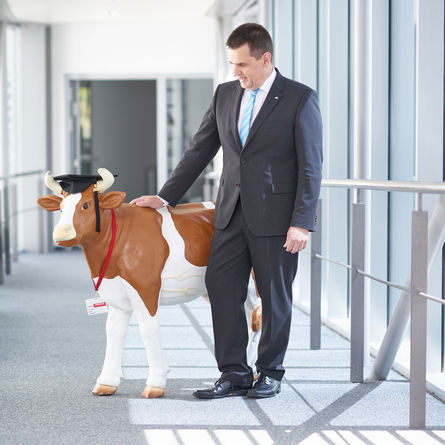
Werner Giselbrecht – commercial director and head of the Milk Board at Hochland – visited almost all major customers, many non-governmental organisations, political leaders and German and French farmers in 2018 and 2019 to present Hochland’s goals, in particular the goal of sustainable milk production by 2025, and to explain the background. He was accompanied by Elsa, a replica of a dairy cow, who helped many of the people he visited to gain a clear understanding of the issues involved in sustainable milk production.
We see our responsibility as being a protagonist in society. Compliance with legal requirements is essential for us. In the Code of Conduct and in the guidelines for leadership and cooperation, we have defined values and standards of conduct for Hochland in order to anchor responsible behaviour in the company and in the supply chains.
In various guidelines Hochland has laid down clear rules of conduct in writing. The documents apply to all companies of the Hochland Group and are therefore binding for all employees of Hochland Deutschland GmbH.
Principles of Internal Cooperation
Internal cooperation is guided by the guidelines for leadership and cooperation formulated in 2001. In this document Hochland regulates cooperation in the company based on open, honest and respectful communication.
In 2011 Hochland has also formulated a Code of Conduct for a corporate culture that is transparent both internally and externally. This sets out in writing rules for dealing with colleagues, business partners and competitors. In the Code of Conduct, the company commits itself to responsible and correct action, unconditional compliance with laws and sustainable business practices. It also regulates the handling of company property and confidential information and provides guidance on how to deal with conflicts of interest, complaints and breaches of regulations.
All employees in the company have received personal copies of both documents. They are also available on the Internet: www.hochland-group.com/en/sustainability
Hochland attaches great importance to compliance management and has therefore defined compliance as an important management objective in 2018. The topic is the focus of attention in various corporate divisions. Systematic risk analyses have been carried out, instructions for action derived from them and preventive measures initiated. Departments have received training and advice on compliance issues.
Hochland hired a fully qualified lawyer as Compliance Manager in 2019. The aim here is to contribute to the professionalisation of the division in collaboration with the Risk Manager and the Crisis Management Team. Through the position of Compliance Manager, Hochland intends to further promote the establishment and further development of methods, processes and systems for minimising compliance risks and promoting a compliance culture.

Basics of Cooperation with Suppliers
Hochland also expects its service providers, suppliers and their sub-suppliers to behave in accordance with the company’s guidelines and values. The General Terms and Conditions of Purchase were revised in July 2019 in the Purchasing department. Environmental management and energy management were also included in the purchasing conditions as further sustainability issues. These agreements supplement the already featured commitment of suppliers and their sub-suppliers to the regulations of the BSCI Code of Conduct (amfori Business Social Compliance Initiative – programme for the improvement of social standards in a global value chain) and the ILO standard (International Labour Organization).
Communicating and Implementing Values
During the reporting period Hochland carried out internal training courses on the subject of communicating and implementing values. The training courses focused on the topics of transformation, new performance management, Vision2025 and leadership and cooperation in times of change.
Breaches of Conduct
At Hochland, violations of rules of conduct can be reported to direct superiors, employee representatives or two internal representatives. All reports are treated confidentially, and proven violations are punished irrespective of the position of the person concerned in the company.
No incidents were reported during the reporting period.
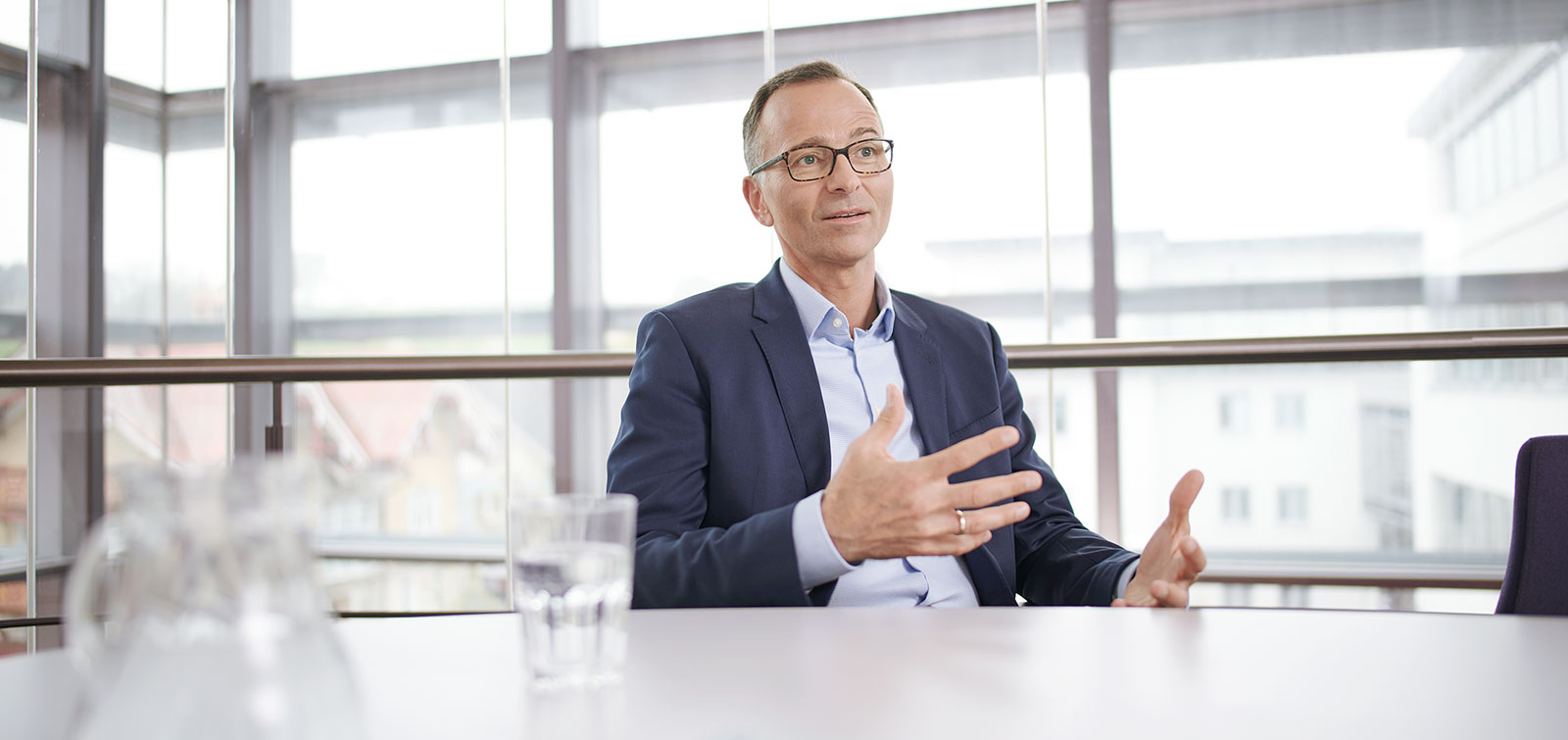
Commitment in the Region
and Beyond
Getting involved in society and actively helping to shape it – this is in keeping with Hochland's self-image and tradition. When supporting social and cultural projects, we focus on the promotion of children and young people.
Hochland is involved with donations in kind and cash donations, which are made in Germany for organisational reasons on behalf of the parent company Hochland SE. In 2019 Hochland revised its donation strategy to bring it into line with the current size and importance of the company as a whole and its corporate culture. One of the key points of the strategy, which will be adopted in the course of 2020, is to move away from the previous limitation to regional projects. This restriction has so far been justified by the family business’s ties to the regions in which Hochland operates and the aim of gaining a broader insight into how the money is used.
Hochland intends to continue to fulfil its role as a good neighbour in future and support local institutions as before, thereby strengthening the local common good. In addition, a donation budget for long-term supraregional projects will be available from 2020. The total donation income of the Hochland Group will be published in the Hochland annual report in the future.
Support for Children and Young People
Supporting children and young people is particularly important to Hochland as a locally based family business. The regional institutions that Hochland supports with financial and material donations therefore include kindergartens, day care centres and schools.
Food Bank Support
Hochland sometimes produces temporary surplus stocks which for various reasons do not find their way into regular sales. For this reason, the company has long cooperated closely with the food bank movement in Germany. The food banks ensure that Hochland’s unsold but perfectly good food is made available to people in need. In this way the products reach people in regions from Stuttgart to Vorarlberg and do not have to be destroyed.
Engagement for Refugees
Hochland is looking to contribute to tackling current social challenges as far as it is able. In the spring of 2015, the company made a company-owned residential building available for refugees. This accommodation remained in place until the end of 2019. Hochland is keen to set an example with regard to socially integrating new fellow citizens. Even though legal and bureaucratic hurdles still exist and good language skills are an absolute prerequisite, Hochland is achieving success in the professional and social integration of refugees.
Hochland currently employs around 15 people with a refugee background, mainly in the production area. Those who employ refugees can create multiple benefits - for their own company, for the economy in general, for the refugees who find protection here, and for society. Hochland is committed to ensuring that people who are in work or training can remain in Germany regardless of their residence status.
McDonald’s Children’s Aid
For many years, Hochland has supported the McDonald’s Kinderhilfe Stiftung Children’s Aid with donations in kind. In addition, Hochland took over sponsorship of an apartment in the Ronald McDonald Haus München-Großhadern in 2005 and has supported it with a fixed amount of money every year since then. While seriously ill children are treated in neighbouring hospitals, their parents and siblings can live in one of the 22 Ronald McDonald houses in Germany.